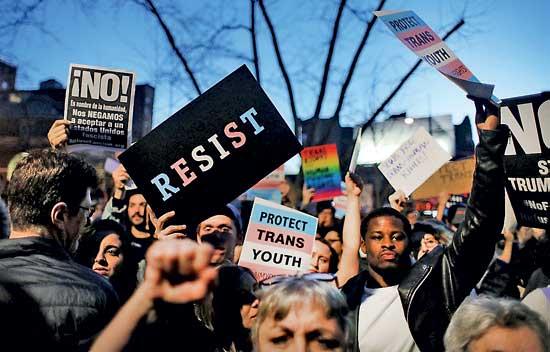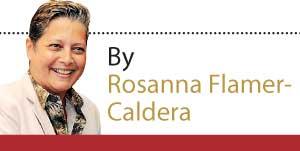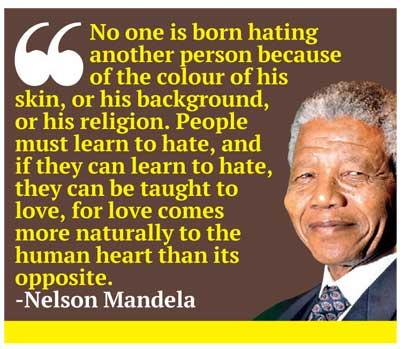Reply To:
Name - Reply Comment
These experiences of my own lead me to note with concern our collective treatment of other minority groups in Sri Lanka, during these uncertain times
Sri Lanka has been through turbulent and transformative times over recent years, which have affected all of us living here.
Our weak and divided political class and what amounts to a Police State has created an atmosphere of insecurity for us all and heightened persecution of minority groups.
None of us can ignore reports from Muslim fellow citizens, who describe being targeted for abuse, police harassment and unlawful arrests, in part as a result of the political failure and ensuing chaos.
Whatever your religious or ethnic background, or indeed your sexual orientation or gender identity, these are dangerous and divisive times.
Perhaps it is because I have been familiar with the label of ‘outsider’ for all of my life, that this targeting of difference has resonated so deeply with me.
It has made me reflect on my own story and the merits of sharing it at this time. A story that is proudly Sri Lankan, without being entirely typical. A minority story, I suppose, but nonetheless of importance to the mainstream.
I was born in Sri Lanka into a mixed-race family of Dutch descent. Due to my Dutch ancestry, I am lighter-skinned, which itself is a marker of difference, albeit one closely related to privilege. My credentials as a native Sri Lankan have often been in question.
But the characteristic that has defined me as ‘different’ throughout my life has been my sexuality. Since returning home from a stay in the US nearly 30 years ago, I have become Sri Lanka’s most high-profile ‘out’ lesbian, through the work I do for the LGBTIQ (lesbian, gay, bisexual, transgender, intersex and questioning/queer) community here and abroad.
As a result, my life experience is an ongoing collection of threatening or humiliating situations and micro-aggressions.
Verbal abuse has been levelled at me for not being a ‘real woman’. People have harassed me when I enter the correct washroom for my gender. It is now a frequent occurrence when using public restrooms.
 Some weeks ago, when I was at a large institution for a work presentation on diversity and inclusion in the workplace ironically, I asked a member of staff in the building where the washroom was, only to be directed towards the men’s toilet.
Some weeks ago, when I was at a large institution for a work presentation on diversity and inclusion in the workplace ironically, I asked a member of staff in the building where the washroom was, only to be directed towards the men’s toilet.
It was not that I was mistaken for a man; I have come to anticipate these unpleasant reactions to unremarkable things, such as the way I dress or the fact that I wear my hair short. “Gahaniekthe Pirimiyekthe?” (“woman or man?”) is the comment that is most frequent and consistent. Going through security at the airport is a battle to assert my identity as a woman, while male security tries to frisk me.
Having grown up among a loving and supportive family, I have been given the self-confidence to expect people to afford me some dignity. I do not cower and accept such ill-treatment. But of course, the whole situation makes me angry, and holding anger is exhausting, which is why I mostly choose avoidance. These days I rarely go out other than for work.
There is also a question of personal safety. I have narrowly avoided being physically attacked by maintaining a state of hyper-vigilance. Car doors must be locked; living room curtains must be drawn. Is there anyone following me? Routes to safety must be considered. This preoccupation with being victimised affects my behaviour; I can never fully relax.
This is the everyday reality of being oppressed and persecuted on the basis of an immutable and harmless characteristic. This is to say nothing of the complicity of the law in my oppression; Sri Lanka is one of 44 countries worldwide to specifically criminalise lesbian women (https://www.humandignitytrust.org/lgbt-the-law/map-of-criminalisation/), breaching the nation’s international duty before the Convention on the Elimination of all Forms of Discrimination Against Women (CEDAW), among other human rights commitments. 
Recently, the UN Independent Expert on Sexual Orientation and Gender Identity, Mr Victor Madrigal-Borloz, stated in his latest report that Lesbian, bi & trans women are more likely to experience violence, exclusion from the labour market and health services than others. Sri Lanka is no exception in this regard.
"Our weak and divided political class and what amounts to a Police State has created an atmosphere of insecurity for us all and heightened persecution for minority groups"
These experiences of my own lead me to note with concern our collective treatment of other minority groups in Sri Lanka, during these uncertain times.
Despite obvious differences, we all hold so much in common. We are all, in one way or another, victims of a disastrous political era, which leaves us all worrying for ours and our country’s future. We can all be affected by prejudice. We can all rise or fall depending on who is nearest to us.
At the Sri Lankan LGBTIQ Pride celebrations last June we chose the theme ‘We are family’ to highlight how ordinary support from relatives and loved ones, impacts on the wellbeing of LGBTIQ people. The idea resonated with many in our community. There is no question that family relationships and their potential to profoundly affect our lives is a universal experience.
But I would go further; we are all unbreakably interconnected. Outside the family, the unit is the neighbourhood or local community, and then outside of that is our nation; a society that is constructed out of our responsibility to fellow citizens.
It seems to me that, amid so much confusion and mistrust, we can only benefit from a mutually supportive approach. Like any good family. As we come close to electing a President for our country, we should give thought to what we would like to see in the future of this country where all of us have been born and raised and are so proud to call, home. Our home, therefore, should thrive without the violence, discrimination and marginalization that is now prevalent within. Our home should be a safe haven for all of us, regardless of our sexual orientation, gender identity, religion, ethnicity or other. Our home should be one of love and respect for whoever we are.
“No one is born hating another person because of the colour of his skin, or his background, or his religion. People must learn to hate, and if they can learn to hate, they can be taught to love, for love comes more naturally to the human heart than its opposite.” -Nelson Mandela